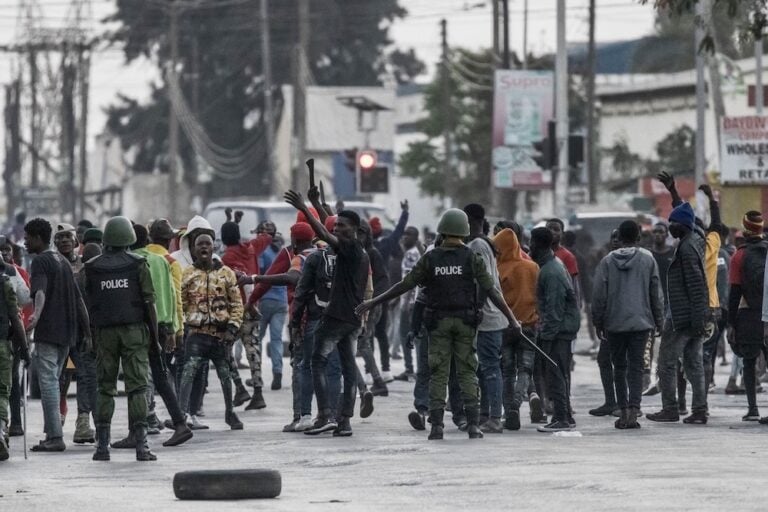(MISA/IFEX) – Armed police surrounded printing presses where “Post” editor-in-chief Fred M’membe and three other journalists were working on a crisis edition following the 10 March 1999 detention of nearly all of the Zambian independent daily’s journalists. **Updates previous IFEX alerts of 10 March 1999** Police sealed off the paper’s printing press on Chandwe Musonda […]
(MISA/IFEX) – Armed police surrounded printing presses where “Post”
editor-in-chief Fred M’membe and three other journalists were working on
a
crisis edition following the 10 March 1999 detention of nearly all of
the
Zambian independent daily’s journalists.
**Updates previous IFEX alerts of 10 March 1999**
Police sealed off the paper’s printing press on Chandwe Musonda road in
the
Northern Industrial area (of Lusaka, the capital) in early evening. They
cut
off power and changed locks at the gates as they made moves to arrest
the
four journalists. Police are now controlling movement to and from the
newspaper premises.
Sources at the “Post” named those holed up in the building with M’membe
as
reporters Sam Mujuda and Dickson Jere, and executive editor Arthur
Simuchoba. An unspecified number of administrative and distribution
staff
are also believed to be in the building.
Six other journalists were arrested from their homes earlier, while the
seventh, Macpherson Muyumba, is still unaccounted for. He has not been
seen
by any of his colleagues or family and is feared arrested.
The recent development leaves only five reporters outside custody. Two
of
these are on assignment in South Africa, one is in Tanzania and the last
two
are in hiding. It is however certain that the paper will not hit the
streets
on 11 March, a goal M’membe said the Zambian government was aiming for.
Background Information
On 9 March, police in the Zambian capital, Lusaka, fanned out over the
city
to arrest journalists from the “Post” newspaper, apparently after an
order
for them to arrest all “Post” journalists before dawn. By 6 a.m. (local
time), police had arrested five reporters: Brighton Phiri, Kelvin
Shimo,
Joe Kaunda, Amos Malupenga and Lubasi Katunda.
The crackdown on the journalists followed an uproar caused in the
National
Assembly stemming from the lead story in the “Post” on 9 March. The
story,
entitled “Angola Worries Zambia Army, ZAF”, prompted National Assembly
Deputy Speaker Simon Mwila to order Defence Minister Chitalu Sampa to
immediately take appropriate action against the “Post”.
The “Post” reports that Mwila made the directive to Sampa following a
point
of order by a fellow member of parliament in which the MP questioned
whether
the “Post” was justified to carry a story on the country’s low military
capabilities. Mwila told the House that he was concerned about the
contents
of the newspaper article which exhibited a high level of unpatriotism
towards the security of the country. A fellow MP charged that the
article
had managed to lay bare the country’s military secrets by publishing an
inventory of the weaponry.
Recommended Action
Send appeals to authorities:
is a
serious violation of international treaties guaranteeing freedom of
expression and media freedom
own
Bill of Rights with respect to media freedom and freedom of expression
Appeals To
His Excellency President Frederick Chiluba
President of the Republic of Zambia
Fax: +260 1 221939
E-mail: state@zamnet.zm or mfalus@zamnet.zmThe Hon. Newstead Zimba
Minister of Information and Broadcasting Services
Phone: +260 1 254487 / 260 1 253486
Fax: +260 1 253456Mr. Francis Ndhlovu
Inspector General of Police
P.O. Box 50103
Lusaka
Fax: +260 1 253537The Zambian representative in your country. In Canada and the United
States,
send appeals to:His Excellency Dunstan W. Kamana
High Commissioner
2419 Massachusetts Avenue N.W.
Washington, 20008 U.S.A.
Fax: +1 202 332 0826
Please copy appeals to the source if possible.


